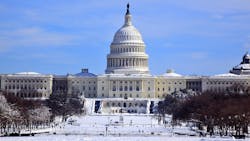The Republican sweep across both wings of Congress means that the party’s priorities will have significant influence on new legislation and federal budgeting for the next four years. These bills are not likely to affect carriers within 12 months—but in 2025, fleets will witness and participate in debates over funding bills and economic policies.
This is the third part of a three-part series on 2025's regulatory outlook. You can read part one here and part two here.
It is a crucial time for carriers to make their concerns known. The products of these debates will affect the transportation industry for several years. The most prominent debate going into 2025 is renewed transportation funding.
“The new infrastructure bill has to be formulated by the Congress that will be taking shape in January,” David Heller, VP of government affairs for the Truckload Carriers Association, told FleetOwner. “You’re going to see more and more conversations in regard to what the next infrastructure bill looks like.”
Transportation funding talks begin
This year, lawmakers will ramp up discussions on the next major funding bill for surface transportation infrastructure. The discussions are an opportunity for the trucking industry to voice its concerns and infrastructure needs.
The last major funding measure, the Infrastructure Investment and Jobs Act published in 2021, went far beyond the business-as-usual reauthorization to fund highways, bridges, and roads. Also known as the Bipartisan Infrastructure Law, IIJA included historic provisions for surface transportation, drinking water, electric vehicle infrastructure, and more—amounting up to $1.2 trillion. IIJA is set to expire in September 2026.
See also: Heller: Road ahead is paved in politics
Republican Congressional members often voted against increasing broad infrastructure funding in recent years, but support for specifically surface transportation infrastructure is still a major Republican infrastructure principle.
Lower corporate taxes
Trump promised lower corporate taxes under his second term. He suggested lowering the corporate income tax rate from 21% to 20% and as low as 15% for some companies that make their products in the U.S.
Congress will ultimately be responsible to implement these priorities. The National Motor Freight Traffic Association expects the new government to extend key portions of the 2017 Tax Cuts and Jobs Act that is set to expire in 2025.
Well-maintained highways are essential for smooth, cost-effective fleet operations. As lawmakers begin negotiations, trucking organizations will be key vocal advocates for carriers’ interests in 2025. Programs like the Calls on Washington facilitated by TCA and the American Trucking Associations present an opportunity for carriers to share their thoughts on legislation.
Truck parking
Truck parking funding will be a top issue for industry associations as they advocate for trucking in the next funding bill.
Parking availability was one of the most pressing issues for carriers and drivers in 2024, according to ATRI. Parking is also a regulatory priority for associations like ATA and TCA. While IIJA included no direct funding for truck parking, grant programs funded by the bill contributed millions of dollars to building additional parking spaces in 2024 alone.
Truck parking bills often receive support from both political parties, making the issue more likely to receive funding than other spending measures.
“It has wide bipartisan support and will get included into the next highway reauthorization bill,” TCA’s Heller said.
Alternatives to fuel taxes
Another major Republican infrastructure principle is to find alternative revenue streams for the Highway Trust Fund.
The vast majority of the Highway Trust Fund’s cash comes from gas and diesel taxes. The population of zero-emission vehicles is growing nationwide, and trucks continue to improve their fuel efficiency, weakening fossil fuels’ dominance in transportation.
The Congressional Budget Office projects the Highway Trust Fund’s spending will exceed its revenue by billions of dollars in only a few years. Some lawmakers have proposed new types of fuel-agnostic fees to ensure EVs contribute to highway funding.
“The fuel tax is there and has generated low administrative costs for generations. But the reality is that, because our trucks and passenger vehicles are going farther on less fuel than ever before, they’re paying less at the pump,” Heller said. “The conversation is going to transition into how we develop a highway trust fund that can be sustainable and support the infrastructure needs of this country.”
About the Author
Jeremy Wolfe
Editor
Editor Jeremy Wolfe joined the FleetOwner team in February 2024. He graduated from the University of Wisconsin-Stevens Point with majors in English and Philosophy. He previously served as Editor for Endeavor Business Media's Water Group publications.

